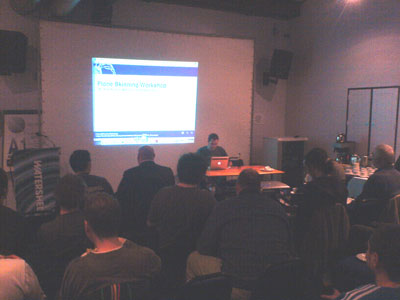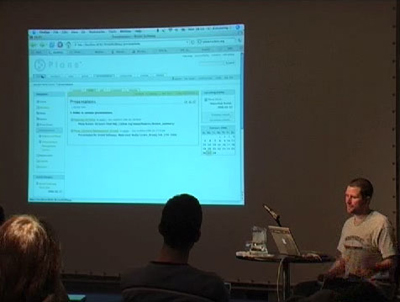
I am really pleased to say that the Plone Skinning presentation last night was a success! About 30 local web designers/developers and people interested in using Plone turned up – a much higher attendance than my previous “Plone Demo” talk. I used the Plone S5 product to create a simple set of slides with a few bullet points to keep me from jumping around too much, but it was mostly a hands on presentation demonstrating a bit of basic customisation via the ZMI, then the process for creating a filesystem based skin.
I ran plone locally and used dreamweaver (in code view with large fonts) to do ZPT editing to keep things familiar for those designers who may be scared by the idea of terminals and Emacs!
I also tried to dispell the “all plone sites look the same” myth by taking a random design I had knocked up as a static html page and inserting the minimum possible ZPT markup to make it function as a front end plone main template rendering the body content and portlets (with none of the plone CSS).
The Q&A was really good – it ranged from basic questions about templating to “can plone do….?” type questions. I think I managed to field them all fairly well – i’ll have to wait to see the video (coming soon) to listen back for any clangers I may have made. I was disappointed however that all the free beer had gone by the end of the Q&A – a conspiracy maybe? “psstt… keep Rick talking while we drink all the beer – ask him if there is a cow-milking module available…”.
The event was sponsored by Knowledge West (room/projector hire/buffet) and beer kindly provided by Team Rubber.
I have volunteered to give another Plone related skillswap at the Watershed in Bristol (UK), on 16th January. The previous one (a general plone demo) went down well, and this time I am going to cover the basics of skinning a plone site, from basic Through The Web (TTW) customisation, to creating an installable skin product. I think it will be streamed live – check here for details. If you are in the Bristol area come along (it’s free)!
I am going to rig up a device that gives me an electric shock every time I say the word “umm..”, to train me up abit better for this public speaking lark..

it’s the start of day three of plone conference 2006 and I am stuffed with both plone knowlege and lovely delicious fatty food. This hasn’t been as debauched as previous conferences (for the netsight contingent at least) as the jet lag has made us flake out in the evening before we manage to to do any serious damage to our livers.
Last night we took a cab up to a mall to try to procure some cheap consumer electronics – the cab ride there and back was an experience in itself – the first driver hadn’t got a clue where he was going and was asking for directions from us, while mysteriously changing lanes and indicating for no reason – the driver on the way back thought he was in Gran Turismo or something.

i’m two days into plone conference 2006 and it has all been a bit of a whirlwind so far. I’m eight hours behind UK time and travelled 26 hours to get here after missing our connecting flight in houston, thanks to some helpful individual at passport control who wouldn’t let us jump the queue.
so far we haven’t ventured much further than three or four blocks away from the venue, but luckily there are ample bars and restaurants close by. The hotel has good wifi, the conference venue wifi has been intermittent but seems to be improving. I’ve been too busy to blog much, but I have uploaded one or two photos to flicker.
The conference itself has been interesting and the keynote this morning has given me a clearer understanding of where plone is at the moment and where it is going. I was also pleased to note that I am not alone in having trouble with migrations between version and at least it is a recognised issue and much thought and effort is going into a solution, and that solution involves being able to dump a sites content into an intermediate format that can be used to populate a new site, thus giving me a way to get my content where I can see it, rather than hidden in zodb/zexp voodoo.

At the end of October, myself and two other Netsight Plonistas will be off to Plone Conference 2006 in Seattle [Broken Link Removed]. Looking forward to meeting up with some plone gurus over a beer or several.

many moons ago, back in february myself and Matt Hamilton of Netsight did a plone demo at the watershed media centre in Bristol. This was the first in a series of “SkillSwaps” as part of the Bristol branch of SkillSwap based in Brighton. I’ve only just got round to blogging about it now due to my blogging hiatus!
The video feed is online here (note that this link skips forward a few chapters to where I actually start talking – before that is several minutes of people arriving and introductions etc).






Any chance you could make the hacked main_template.pt available to look at?
Shane Graber 2007-01-17 13:35:33
Congratulations for this successfull event. Is there any Screencast available for the Plone comunity ?
Norbert M Haigermoser 2007-01-17 12:01:07
Yes the presentation was videoed and will be put online in the near future – I will post a link on my blog when it is ready.
Rick 2007-01-17 12:06:58
sure – http://www.rickhurst.co.uk/code/minimal_main_template.pt.txt
in fact the doctype slot and top slot aren’t strictly necessary here, but this shows the basics of rendering the body content and portlets (just cut and pasted from plone default main_template.
word of warning though, as this doesn’t render any links to places like the prefs_portalskin_form or the ZMI, inexperienced users may lock themselves out if not careful! Having a minimal template like this is only intended for where you use a seperate skin (i.e. usually Plone Default) for editing.
Rick 2007-01-17 14:48:17
Looking forward to seeing the screencast of this event when its ready, especially after recently watching the video on the first Plone event which was great – any idea when this might be up? 🙂
David 2007-02-25 11:03:02
I’ve been nagging the guy who is sorting the video – he is trying to get it sorted but has a genuine lack of editing time available at the moment i’m afraid 🙁
Rick 2007-02-25 19:54:59
It’s look something interesting. May I know where i should get the detail of Plone Skinning Information
Ritz 2007-12-27 02:24:30